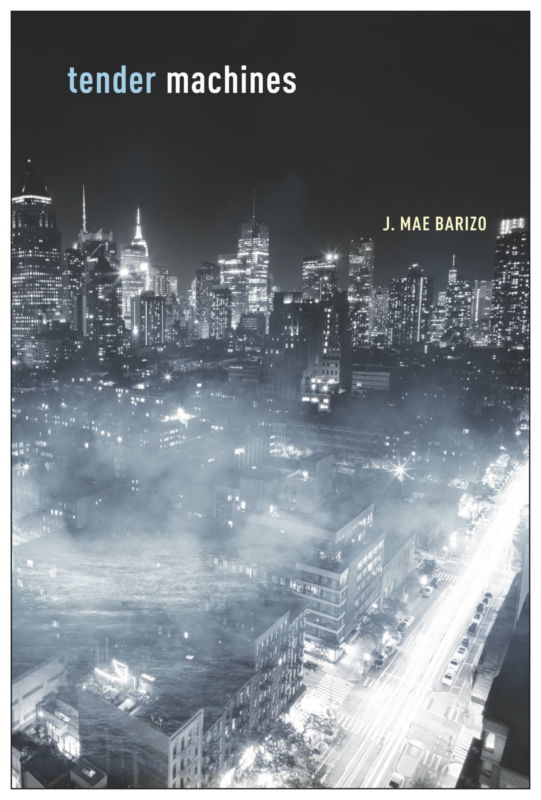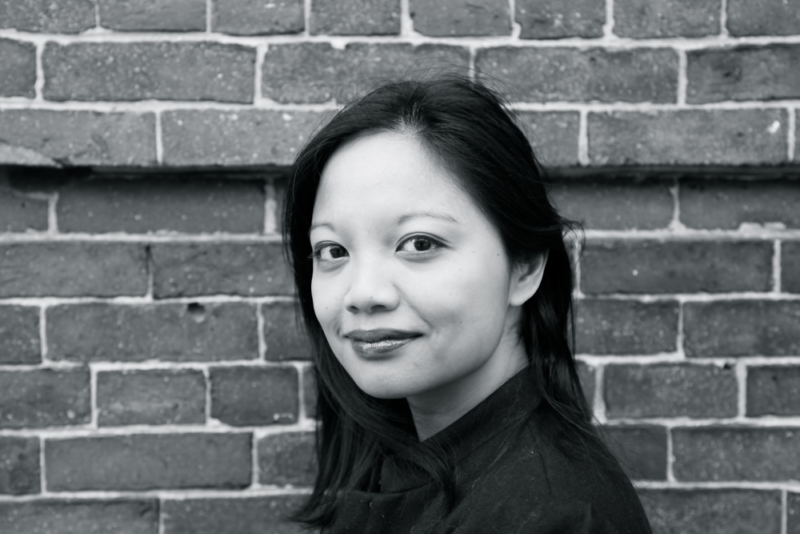
Tender Machines, J. Mae Barizo’s second full-length poetry collection, begins with the epigraph from Sylvia Plath’s Bell Jar that tenderness is what women see in other women that they don’t see in a man. This book is for women, in all their roles and royalties—daughter, friend, lover, mother, great-grandmother. As a poet, librettist, and musician, Barizo creates lyrical urgency in each of her poems. The poems are akin to sheet music, telling the reader how they are supposed to be read and what symphonies they will evoke. The resulting experience is one of transcendence, euphoria, and calmness, all at once.
At the book launch hosted by The New School, Barizo described the sonnet as an attempt to escape from a cage. There is a small section in the book titled, small essays on disappearances, written largely in a poem format. I was not concerned with why the poet chose to call them essays (from the French, essai, meaning trial or attempt), but how each poem within that section tangoes with the sonnet. Most of the poems in that section are twelve, thirteen, or sixteen lines, always skirting around the sonnet, as if teasing it. An attempt at disappearing. An attempt at reaching the sonnet. An attempt at escaping from the cage.
The book is a dynamic, tender reckoning with what it means to honor the ancestors we come from and the children and “not-children” we will leave behind us. In “Pleistocene,” Barizo writes, “What little deaths we leave / our children, our not-children.” One of the beginning poems, “Fugue on the Maiden Name of my Mother,” explores the complex relationship between the colonizer and his colonial subject. Barizo is curious about the Spanish surname of her mother, Miraflores, and finds out it was given by the colonizer to her great-great-grandmother because she was his favorite concubine. The ending line of the poem is as jarring as the circumstance, “my oppressor my settler my colonizer, my love.”
In the poem that comes immediately after that, “Woman Contemplates her Complicity,” Barizo sets her Filipino identity against/alongside a white backdrop, “I’m complicit, with my manicure / and expertly-dyed hair” and interrogates what side she is on. She ends the poem with “My skin, my / skin beneath the sun of my ancestors darkens so very easily.”

Barizo is also a devout student of the environment and spatiality—her poems embody their set landscape masterfully. Tender Machines is largely set in New York between two disasters: 9/11 and our current pandemic. In one of the poems in small essays on disappearance, she writes:
All / my life sacrificed to the arrogance of cities, / their empires of skin.
Another poem she begins with:
Before the towers fell
I loved for a time, carried
it around like a pacemaker
sing singing the concrete river
Barizo evokes the city’s landscapes such as Madison Ave and Zabriskie Point in various forms and fictions—letting desire and tenderness act as the conductor of the entire orchestra that is this collection. We depart from, and return to, the same landscapes, albeit with changes in the speaker, in the landscape, in our own selves.
The music in Tender Machines is bursting at the seams. Reading these poems evoked a similar feeling as listening to Urdu and Farsi ghazals from my childhood—composed in set melodies, called raag, a rich poetic tradition in South Asia. One of the charming qualities of a ghazal is its use of repetition to evoke lyricism—in the form of radif, which is the refrain at the end of every second hemistich, or takrar, which is the repetition of certain words or phrases within a couplet. In “Lux Aeterna,” a sonnet which appears through the later half of the book, Barizo writes:
Tell me
that I remember it correctly, that the light
will lick and lick the damage clean. That it is not
ruin already. Tell me.
All but one poem in Tender Machines spill over to the next page. The brevity of the poems, precision of its thought and language, make them more appealing to be memorized, performed orally, sung. In “Andante Cantabile,” one of the more shorter poems in the collection, Barizo writes:
It is the autumn of my fortieth year
My follicles are turning dry
See the muteness of my hands?
A love I once gave away
Haunts me everywhere.
Reading this book is like floating, like enjoying an exquisite—though ephemeral—orchestra. I laughed, I wept, I gasped. One does not need a playlist along with this book—it acts as one in itself.
Tender Machines
by J. Mae Barizo
Tupelo Press, $21.95

Javeria Hasnain is a Pakistani poet and writer, and a Fulbright scholar at The New School, NY, pursuing an MFA in Poetry. Her poems and prose have appeared/are forthcoming in Poet Lore, Isele, The Mascara Review, The Margins, and elsewhere. She is a runner-up for the 2022 The Bird in Your Hands prize and has received a nomination for Best Microfiction 2023. She is an alum of the IWP’s Summer Institute at the University of Iowa.


